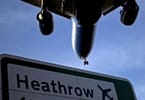Jamaica’s Minister of Tourism Edmund Bartlett has taken the issue of the planned increase in Air Passenger Duty (APD) to British Members of Parliament (MPs) and Members of the House of Lords in London.
Bartlett, who was guest speaker at the Caribbean Council’s annual Parliamentary reception held at the House of Lords at Westminster, charged that the increase in APD, as proposed by the British government, is unfair and will undermine Jamaican and Caribbean tourism.
He argued that the proposed new structure of the APD, in which countries are placed in charging bands determined by the distance of their capital city from London, was discriminatory, in that it favoured large developed countries over smaller ones, which operate in the same highly competitive environment.
“This change makes APD an inherently unfair tax and not the least bit ‘green’,” he said. “The structure of APD as an environmental tax, suggests that the impact of a flight to Jamaica or Barbados is greater than one to Miami, Los Angeles or Maui. Why should Caribbean countries with relatively low emissions suffer the effects of an environmental tax, in favour of the world’s biggest polluter?” he questioned.
According to the Tourism Minister, the changes, which are scheduled to take effect in November, will have a major effect on tourism to the Caribbean, thereby impacting the economies of the region and travel by members of the United Kingdom (UK) Caribbean Diaspora.
The UK has, for several years, imposed an APD on all passengers departing UK airports. However, as part of efforts to reduce emissions from aviation, the British Government is proposing a reform to the tax. The aim is to ensure that those who travel the farthest meet the cost of the environmental impact.
The revised regime, as proposed, will place long haul destinations like Jamaica in one of the highest bands, with economy class passengers facing a tax of £50 (US$74) per ticket as of November 2009, and the amount increasing to £75 (US$112) in 2010. The proposed tax for premium economy, business, and first class tickets, will be double this amount.
The existing two distance-related bands will be replaced by four, placing countries in categories A, B, C or D depending on the distance between their capital cities and London.
“By placing the Caribbean in B and C, but the whole of the United States in band B, we are immediately at a significant price disadvantage. An unfortunate consequence of the geographical banding by capital is that the major developed countries in the region, the United States and Canada, are benefitting at the expense of less developed nations,” Bartlett said.
“The region is heavily dependent on tourism and many of the economies are still coming to grips with the loss of the banana trade. In countries like Jamaica, suffering from declining revenues from agriculture and mining, tourism has become the leading source of foreign exchange earning.”
“This will occur at a time when the impact of the global economic downturn is already being felt and the projections of the Caribbean Tourism Organisation suggest a sharp fall in visitor arrivals in 2009 and 2010,” he noted further.
He informed the British MPs and Lords that the Jamaica Tourist Board and neighbouring Caribbean tourist boards have been behind a lobby against the change to the APD, organised by the UK industry publication, Travel Trade Gazette.
WHAT TO TAKE AWAY FROM THIS ARTICLE:
- According to the Tourism Minister, the changes, which are scheduled to take effect in November, will have a major effect on tourism to the Caribbean, thereby impacting the economies of the region and travel by members of the United Kingdom (UK) Caribbean Diaspora.
- He argued that the proposed new structure of the APD, in which countries are placed in charging bands determined by the distance of their capital city from London, was discriminatory, in that it favoured large developed countries over smaller ones, which operate in the same highly competitive environment.
- “This will occur at a time when the impact of the global economic downturn is already being felt and the projections of the Caribbean Tourism Organisation suggest a sharp fall in visitor arrivals in 2009 and 2010,”.






















